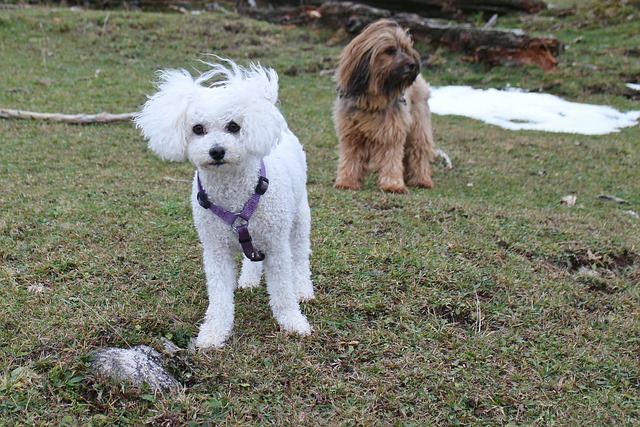Cavachons do not bark a lot. They are somewhat unique among smaller breeds because they are a relatively quiet dog.
Although there are exceptions to the rule, most Cavachons defy the small “yappy dog” stereotype.
About The Cavachon
The Cavachon is a hybrid breed that comes from breeding a Cavalier King Charles Spaniel with a Bichon Frise.
A mix of the two species, the Cavachon has mild-mannered King Charles spaniel and the feisty Bichon traits.
Does the Cavalier King Charles Spaniel Bark A Lot?
The Cavalier King Charles Spaniel is a docile companion dog that is easy to please.
This gentle toy breed is content so long as you meet their exercise needs (these small dogs are surprisingly energetic!) and ensure they have regular companionship.
The Cavalier King Charles Spaniel tends only to bark when warranted or encountering other dogs (so long as we meet their basic needs.)
However, when their needs go unmet, the CKC can be a problem barker.
Does the Bichon Frise Bark A Lot?
The Bichon Frise is a mischievous and energetic dog with a bubbly personality.
Friendly with everyone and a great family dog, the Bichon does have its challenges (housetraining can be exhausting!)
With a good outlet for energy and regular companionship, the Bichon is relatively easy to please.
The Bichon Frise can be a vocal breed even when we meet their needs. When left alone frequently, however, the term “problem barking” is an understatement.
Do Cavachons Bark A Lot?
The Cavachon has the energy of the Bichon, the barking habits of the Cavalier King Charles, and the affectionate nature of both breeds.
Like the Cavalier King Charles and the Bichon Frise, the Cavachon is a companion dog that will become a problem barker if left too frequently.
Problem Barking
Problem barking is common for small breeds, the most common reasons for this behavior include:
- Lack of exercise
- Lack of companionship
- Lack of socialization
- Boredom
- “Small dog syndrome.”
Lack of Exercise
The number one reason for unwanted behavior in dogs is lack of exercise. Dogs are not supposed to stay inside all day and cannot thrive on just one short walk a day!
Like us, dogs need multiple forms of regular exercise to stay in shape and expend extra energy!
When our dogs don’t have an outlet for extra energy, they get frustrated, and cabin fever drives them to act out.
Acting out can mean barking excessively, chewing things, attempting escape, and other undesirable behavior.
Lack of Companionship
Cavalier King Charles spaniels, Bichon Frise’s, and Cavachons are all companion dogs, and they thrive on companionship.
If you are thinking about adding one of these breeds to your family, be sure that you will not be a family that leaves them alone for long periods.
When these small companion breeds get lonely, they become problem barkers, trying to get someone to come to them.
Unfortunately, this isn’t the only consequence of loneliness for these dogs – they often also become depressed.
If you are out of the home for long periods, consider enrolling your pup in doggy daycare or hiring a dog walker to drop in and see them daily.
Boredom
Like humans, dogs need mental stimulation.
Sitting at home staring at the same four walls is not entertaining for anyone, but if you aren’t spending time with your dog, this is what they wind up doing.
When your dog gets bored, problem barking and destructive behavior can become a real problem.
If you do have to leave your dog alone during the day, try leaving them with an interactive toy that can keep them engaged until you get home.
Check out these Dog Toys for dealing with boredom…
“Small Dog Syndrome”
Lastly, “Small dog syndrome” is a bit of concern with these smaller companion breeds.
Also called “Canine Napoleon Complex,” small dog syndrome happens when we treat small dogs so delicately because they begin to take control of the relationship.
Dogs that suffer from small dog syndrome manifest all the stereotypical “small dog behaviors” that we think of when thinking of bothersome or “yappy” small dogs.
For example, snapping, biting, growling, resource guarding, persistent barking, not listening, refusing to follow commands, begging for food, and acting like they rule the world.
Small dog syndrome happens when we do not set appropriate limits for our small dogs. Instead, we do everything the professionals tell us not to do!
We carry our small dogs everywhere, feed them from the table, we laugh it off when they begin to guard resources.
We encourage negative behavior by treating these small pups like kings and queens in every way.
Small dog syndrome is not just a problem for a dog’s owner, as these dogs can threaten neighbors and friends, spouses, and siblings and even upset the whole community with their incessant barking.
If your dog shows signs of small dog syndrome, seek the advice of a professional behavioral trainer.
A misstep with a dog with small dog syndrome can easily result in biting, so it is best to leave the job to the professionals!
Conclusion / Summary
When mixing the gene pools of the Cavalier King Charles Spaniel and the Bichon Frise, the Cavachon gets the best of both worlds – especially when it comes to barking!
With a healthy lifestyle of exercise and regular companionship, the playful Cavachon is eager to please and the ideal companion and family dog.


